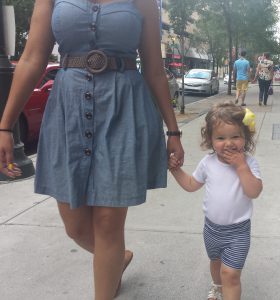Having a baby is considered one of life’s happiest, and most indescribable moments. You spend 9 months growing this little treasure inside of you, and then when it is time, the baby makes its way into the world and into your arms. You are full of emotions, you cry, you’re happy, and you’re tired. Everyone talks about the joy of finally having this new baby in your arms, but what most people fail to mention or talk about is the downside of it. The unspoken truth about what happens to roughly 10-20% of women, postpartum depression or PPD.
Everyone always talks about the joys of parenthood, and how wonderful it

is, even when I was pregnant, that was all anyone ever talked about. The overwhelming love and joy they experienced when they brought their kids into the world, the same feeling I was told I would have soon. At first, when I had my beautiful little girl, I was so happy she was here, but also so tired at the same time due to a long, almost 24-hour labor. But not one person ever talked to me about the realities and possibility of postpartum depression. I guess it was too taboo to talk about, as if no one should bring it up, or they would seem like they were a bad mother. I was not prepared for the range of emotions that followed when I went home with my baby.
How Often Does It Occur?
Statistics show that one in seven women go through postpartum depression following the year that they give birth. These numbers are from women who admitted to having postpartum depression, but the numbers are believed to be even higher due to the stigma surrounding PPD. I never confided in my doctor or honestly answered the hospital’s follow up questions, never giving any signs that I was depressed. I felt too ashamed to admit I was hurting mentally after having this blessing. When I spoke to my best friend over video chat, I couldn’t help but break down and cry. I began to tell her how I felt so tired all the time, and that my nipples hurt so much, as if someone lit a match over them every time my daughter would latch on and drink. Then I told her the worst of it, I told her I did not feel connected to my baby, and that I felt like a horrible mother for it.
Do you know what happened next? My best friend consoled me and told me she felt the exact same way with her first baby. She said that it can be a lot to handle dealing with this new little thing that just sleeps, cries, and shows no gratitude towards you. This baby that just constantly demands everything from you, and expects you to constantly know what it wants without any real communication. She told me how she also did not feel connected to her baby for a couple of months, but that the horrible feeling would go away and that I will love my baby so much and will forget how helpless I was feeling eventually.

I connected with other friends of mine who were mothers, and they all confessed in one way or another that they too had postpartum depression. All of these amazingly strong women I knew went through the same thing, and they did not mention it to anyone else while actually going through it because they were also ashamed. This is why I believe the numbers of these statistics would be so much higher if all the women who go through it actually admitted it to their doctors.
Baby Blues Or Postpartum Depression?
Now let’s talk about the difference between “baby blues” and postpartum. About 70-80% of women experience baby blues. Baby blues last within days, or a maximum of 2 weeks after having a baby. The feelings include mood swings, crying spells, feeling sad or anxious, loss of appetite, and trouble sleeping. Postpartum depression symptoms last longer, and are more severe. It usually begins in the first month of having your baby and can last up to a year.
Postpartum depression can take form in different ways. These feelings are all hormonal because your body goes through so many changes when pregnant and after childbirth. Some people, like myself, are just not prepared for this new change in their lives. I was tired all the time, did not talk to my friends as much, did not go out, and was sore.
Symptoms include:
-
- Feeling sad, hopeless, or overwhelmed. (Check!)
-
- Crying more often or for no apparent reason. (Check!)
-
- Feeling irritable, restless, or moody. (Check!)
-
- Having thoughts of hurting yourself.
-
- Having thoughts of hurting your baby.
-
- Eating too much or too little. (Check!)
-
- Memory problems (Check!)
-
- Grief about loss of who they were before having the baby, (Check!)
-
- No longer enjoy the things you used to enjoy. (Check!)
-
- Not having an interest in the baby, or not feeling connected to your baby. (Check!)
-
- Withdrawing from friends and family.
-
- Doubting your ability to care for your baby. (Check!)
- Headaches or pains in your stomach, or muscle pain.
After going through all of these feelings for the first 2-3 months of my daughter’s life, one day, which I will never forget, I looked down at her while breastfeeding. She looked into my eyes, I looked into hers, and I just felt this immense feeling of unconditional love. I felt so overwhelmed with love, that I began to cry and I felt so guilty that I had not loved her before. That I had not loved her for the past 2-3 months of her life. That I had missed the chance to love her longer when she deserved it.
Break The Taboo
If you experience some or many of the PPD symptoms, talk about it. If you have thoughts of hurting yourself or your baby, or are too depressed to take care of your baby, then it is important to seek help for both your well being and your baby’s. Whether you might need to seek help, or just want to, it is okay if you can not do it alone. I was able to get over my depression with the help of my husband, but some people need a more experienced hand to help them get through it. It may not be an easy battle, especially on your own. Reach out to a loved one, friends, your community, or a medical professional.

Women who do need or want to seek professional help, need to speak with their doctor or nurse, and go to counseling so they can freely speak about how they are feeling, and find a solution. Medication is another solution that your doctor might want to discuss with you as antidepressant medication can relieve some symptoms. If postpartum is not resolved within the year, it can have serious consequences. The mother’s health will decline, and the ability to connect with their baby in the future is unlikely. In turn, the baby may have issues with sleeping, eating, and behavior problems as they grow up.
I was able to overcome my postpartum depression without seeking professional help, but it is important to know that you are not alone. Almost every new mom goes through some sort of baby blues, while some go through PPD. Do not be ashamed to talk about it or seek professional help if you need it. I bring it up to all of my pregnant friends and mothers so they are aware of the risks, unlike me with my first child when no one wanted to talk about it. No one ever told me so I never knew that it happened or was normal. I was ashamed of these feelings I had, and I need everyone to know that it is okay to feel this way. It is important to talk about it with your friends, and family. Do not feel ashamed, bottle it all in, or try to go through it alone. It gets better, and this too shall pass.